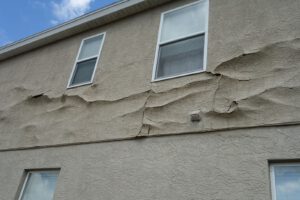Stucco is a durable, low maintenance siding material that’s available in a wide variety of colors and styles. It’s also highly resistant to severe weather conditions, a big bonus for homeowners.

However, like other types of siding, stucco can fail from time to time. This is called deterioration, and it can have an effect on the rest of your home. For professional stucco repair services, you can contact Stucco Repair Philadelphia.
Stucco is a type of material that is meant to protect the exterior walls of your home. However, it’s not unheard of for stucco to deteriorate and cause significant structural damage. This can happen if you’re not careful when it comes to your stucco repair needs, or if your contractor isn’t experienced enough to handle stucco repairs.
If you’re a homeowner, you need to know what the signs of stucco damage are so that you can be prepared for any emergency. The following are some of the most common signs that you should take note of:
When stucco breaks apart, it’s an indication that there is a structural problem with your home. This could be something as simple as a crack in your foundation or as serious as a serious structural issue that needs to be fixed by a licensed contractor.
These cracks can lead to water damage, rot, and foundation problems if not taken care of in a timely manner. This is why it’s important to have an expert inspect your home and fix any issues as soon as possible.
Cracks can be particularly ominous if you live in an area that is prone to earthquakes or shifting land. This is because these conditions can cause your stucco to crack in a way that’s difficult for you to detect on your own.
Another sign that your stucco has gotten damaged is if it’s fading. This can be a result of moisture in the environment, or it may be an issue with your previous contractor’s workmanship.
The fading of your stucco isn’t always a sign that you need to call a professional for stucco repair, but it is an important indicator. If your stucco is fading, it could be a sign that you have a moisture problem, and the damage will only worsen if you don’t fix it.
Mold is a common problem that occurs when stucco deteriorates and doesn’t get remediated. This can cause serious health concerns for your family, as the mold growth can be toxic and dangerous.
If you notice cracks in your stucco, it is best to have them repaired right away. This will prevent the cracks from spreading and causing further damage. In addition, you can save money by addressing the issue early on, instead of waiting until it becomes serious.
There are several reasons that your home’s stucco may be experiencing cracks. One of the most common causes is when stucco is not properly mixed and applied. This can happen when a contractor does not have experience with stucco application or if the materials they use aren’t high-quality.
Another reason stucco is prone to cracking is when the coat thickness is inconsistent. For example, some parts of your house might have 1/4-inch thick stucco, while other areas have 3/4-inch. The thickness of the stucco is important to ensure it can withstand changes in temperature and moisture.
Finally, stucco can also develop cracks because of water infiltration. Water can enter through stucco cracks and cause mold and dampness in your home.
A good way to avoid stucco cracks is to install a weather-resistant coating beneath your stucco. This coating will help your stucco withstand severe weather, helping it to better tolerate temperature changes.
Structural movement such as soil movement like slope creep, expansive soils, earthquakes, and settling can also cause stucco to crack. Additionally, strong winds from tornadoes or hurricanes can damage your property and create structural issues.
Vertical and stair-step-shaped cracks can indicate a problem with the wall itself rather than with your building structure or foundation. They can be caused by thermal expansion, water infiltration, poor installation of the stucco, or a weak base substrate.
These types of cracks should be inspected by a professional masonry expert. They will be able to determine the underlying cause of the cracks and whether they need to be repaired.